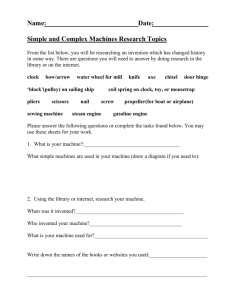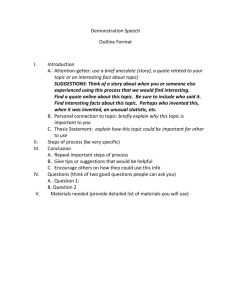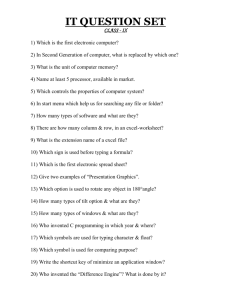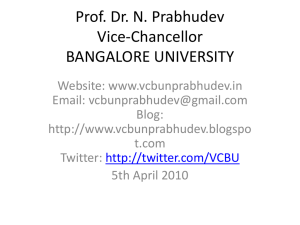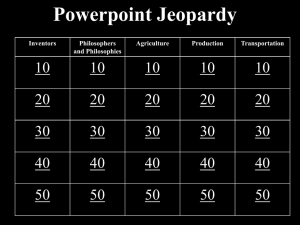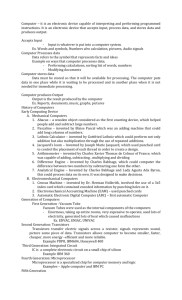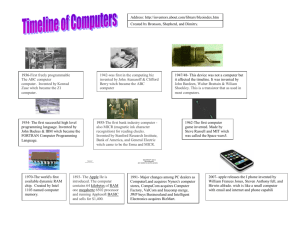A10TimelineCollinsB
advertisement
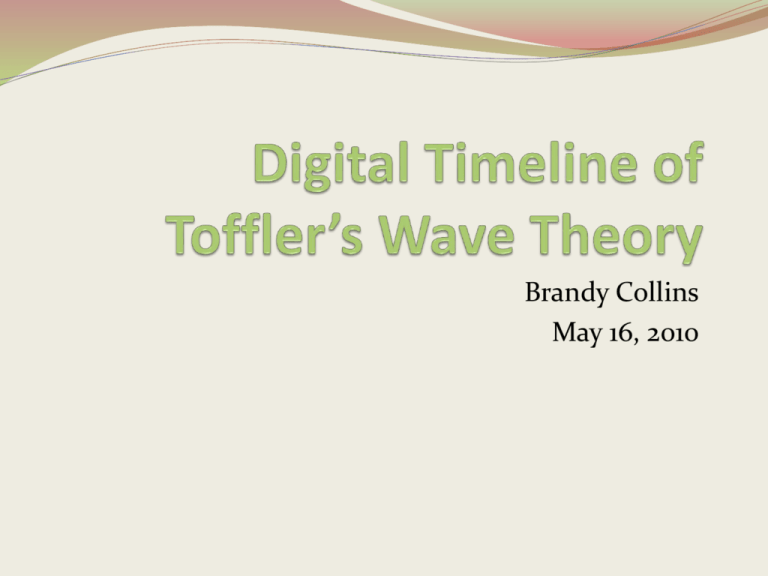
Brandy Collins May 16, 2010 Strand 1 Toffler’s Wave Theory Large, extended families Found land and settled, began domesticating animals and herding cattle The children were typically homeschooled by someone in the family Families become nuclear People moved into larger cities Standardized materials were created and mass production became a reality One Parent families are common, both parents work outside the home Technologies advance: automobiles, computers, cell phones and Internet become common in most households One parent families still common, Both parents work outside the home still common as well The ability to collaborate and communicate with others using technology Digital classrooms, online classes/schools are extremely common Dede, C (Speaker), (2008). The Next Wave, Part 2. Laureate Education, Inc. Thornburg, D. (Speaker), (2008). The Next Wave, Part 1. Laureate Education, Inc. Toffler, Alvin (1980). The Third Wave. New York: Bantam Books Cambridge University Press. Strand 2 Key technological advances and innovations for each decade 1900-- George Eastman makes first portable camera that's affordable and open to the public 1901-Electric typewriter is invented 1903- Orville and Wilbur Wright take the first test flight in their plane at Kitty Hawk, NC 1904-The answering machine is invented 1905-The first Yellow Pages is invented 1906-An animated cartoon is created 1907- The Lamiere brothers create still color photography 1909- First subject on radio talk is about woman's suffrage 1910-Thomas Edison invented the first talking motion picture 1911-Curtiss invented the first Air Conditioner 1911-Kettering invented the first self starter for the automobile 1915-AT&T invented the first long distant radio phone 1919-Charles Strite invents the first pop up toaster 1920- The first commercial radio broadcast is made 1923-Garrett A. Morgan invents the traffic signal 1925-John L. Baird invented the mechanical television 1927- Charles Lindbergh becomes the first man to fly solo across the Atlantic Ocean 1930- Vannevar Bush at MIT invented the "differential analyzer", or analog computer 1932-Edward H. Land invented the Polaroid 1933-Edwin H. Armstrong created the Frequency Modulation (FM) 1934- Joseph Begun invents the first tape recorder for broadcasting - first magnetic recording 1936- Bell Labs invents the voice recognition machine 1940- Peter Goldmark invents modern color television system 1941- Konrad Zuse's Z3, the first computer controlled by software 1942-John Atanasoff and Clifford Berry built the first electronic digital computer 1944-William Kolff invented he kidney dialysis machine 1946-Percy Spencer invented the first microwave 1950- Ralph Schneider invented the first credit card (Diners) 1951-Charles Ginsburg invented the first video tape recorder 1951- Francis W. Davis invented power steering 1956- The first computer hard disk used 1957-Fortran computer language was invented 1958- The computer modem invented 1963-Audio cassette was invented 1964-John G. Kemeny and Tom Kurtz invented the BASIC computer language 1967- The first handheld calculator invented 1968- Douglas Engelbart invented the computer mouse 1969- The arpanet (first internet) invented 1971- James Fergason invented the liquid-crystal display (LCD) 1973-Robert Metcalfe and Xerox invented Ethernet 1978- Robert K. Jarvik invented the artificial heart Jarvik-7 1979-Cell phones were invented 1981-The first IBM-PC computer was invented 1984-The first Apple computer was invented 1985- Windows program invented by Microsoft 1986- Fuji introduced the disposable camera 1988- Digital cellular phones invented 1991- The digital answering machine invented 1993-The Pentium Processor was invented 1995- DVD (Digital Versatile Disc or Digital Video Disc) invented 1996-Web TV was invented 2001-Apple announced their version of the portable music player –The Ipod 2001-Artificial liver invented by Dr. Kenneth Matsumura and Alin Foundation 2003- Toyota's Hybrid Car 2005- YouTube - the online video sharing and viewing community - was invented in 2005 by Steve Chen, Chad Hurley and Jawed Karim (n.d.). Retrieved March 27, 2010, from http://www.infoplease.com/yearbyyear.html 2. (n.d.). Retrieved April 8, 2010, from http://www.kyrene.org/schools/brisas/sunda/decade/1900. htm 1. Strand 3 The Nature of Work: Business and Corporate Philosophies 1900-Only 19% of women of working age were part of the workforce 1908-Henry Ford begins selling automobiles 1913-The U.S. government establishes the Department of Labor 1919-A record number of 4 million workers strike 1920-Farm organization set up lobbies in Washington 1929-The stock market crashes on October 24th—this day became known as “Black Thursday” 1930-1933-The Great Depression Begins 1938-Fair Labor Standards Act establishes the minimum wage 1947-American investments abroad reached an all time high of 26.7 billion 1949-Fair Labor Standards Act outlaws child labor 1950-31% of U.S. women worked outside the home 1950-1st credit cards are issued 1963-Congress passes the Equal Pay Act 1969-The first ATM machine begins operating in New York 1975-Founding of Microsoft 1979-Stagflation Federal Reserve Board tightens down on the supply of money 1980-Unemployment averages 7.1% 1980-President Carter signs first Chrysler bailout 1990-Inception of the Internet for commerce was introduced 1998-The search engine Google was founded 2001-ENRON files for bankruptsy 2009-Bernie Madoff jailed 1. (n.d.). Retrieved April 8, 2010, from http://www.kyrene.org/schools/brisas/sunda/decade/1900. htm Strand 4 Educational theories of learning and instruction 1901-John Dewey interpreted the method of empirical science in educational terms 1902-Edward Thorndike offered his 1st scientific theory of learning 1912-Frederic Burc developed one of the 1st systems of individual instruction at the San Francisco State Normal School 1919-Washburne’s Winnetka Plan was developed 1920-Educational Films came out 1925-Henry Clinton Morrison’s--Morrison Plan Late 1920’s-Lewin’s Field Theory and Science of Instruction were experimented 1930-Fox Films seeks to place a projector in every classroom 1933-Ralph W. Tyler Eight Year Study use of general and behavioral objectives and formative evaluation 1934-Visual Instruction books published at an increased rate 1942-Jean Piaget’s Child Development 1947-B F Skinner’s Operant Conditioning 1949-Ralph Tyler publishes Basic Principles of Curriculum and Instruction 1954-B.F. Skinner publishes The Science o Learning and the Art of Teaching 1956-Benjamin Bloom’s Taxonomy of Educational Objectives 1957-Programmed Instruction 1960-PLATO project begins 1965-Elementary and Secondary Education Act was established 1968-Personalized Instruction—Keller Plan 1969-First broadcast of Sesame Street 1970’s-Robert Mager introduced Criterion Referenced Instruction 1976-Cognitive Science begins to influence education 1982-Mastery of Teaching by Madeline Hunter was published 1983-Howard Gardner publishes Multiple Intelligences 1983-MD Merrill established the Component Display Theory 1990-IDEA (Individuals with Disabilities Educational Act) was put into force 1990’s-Multimedia as an instructional tool becomes more popular 1991-First charter schools begin 1995-Bernie Dodge and Tom March developed Webquest which are used by teachers/instructors 2001-No Child Left Behind was put into act 2008-Obama is elected into office and NCLB may end up lapsing 1. (n.d.). Retrieved April 5, 2010, from http://www.cloudnet.com/~edrbsass/educationhistorytimel ine.html Strand 5 Nature of society and culture: What key events determined the thinking of the decade? The Wright brothers invent the first gas motored and manned airplane 1905- Albert Einstein published the Theory of Relativity and made famous the equation, E = mc2 1906-The Wright brothers sell their first airplane 1907-1st successful human blood transfusion 1911- Charles Franklin Kettering invents the first automobile electrical ignition system 1916-American’s worst polio epidemic 1920-19th Amendment to the Constitution granting women the right to vote was written 1921- Artificial life begins -- the first robot built 1926-Robert Goodard invents liquid fueled rockets 1931-The Empire State Building was completed 1932- Carl C. Magee invents the first parking meter 1933- Richard M. Hollingshead builds a prototype drive-in movie theater in his driveway 1937- The first jet engine is built. 1944- The kidney dialysis machine invented by Willem Kolff 1945- The atomic bomb invented 1947- Mobile phones first invented (although cell phones were not sold commercially until 1983) 1950-The first credit card (Diners) invented by Ralph Schneider 1953- Radial tires invented 1954- Oral contraceptives invented - the pill 1959- The internal pacemaker invented by Wilson Greatbatch 1963-Assassination of John F. Kennedy 1969- The artificial heart invented 1969-First ATM is invented and put into use 1972-President Nixon signs into U.S.—Father’s Day will be the 3rd Sunday in June 1973-Roe vs. Wade 1973- Gene splicing invented 1980- The hepatitis-B vaccine invented 1982- Human growth hormone genetically engineered 1983- Soft bifocal contact lens invented 1986-Shuttle Challenger disaster 1990- The World Wide Web and Internet protocol (HTTP) and WWW language (HTML) created by Tim Berners-Lee 1993-The “Don’t Ask, Don’t Tell” Policy is implemented for the U.S military 1999-Columbine High School Massacre 2001- AbioCor artificial heart invented by Abiomed Vermont becomes the first state in the country to legally recognize civil unions between gay and lesbian couples Florida ballot controversy over presidency occurs—George W. Bush accepts presidency after this occurance 1. (n.d.). Retrieved April 20, 2010, from http://www.unc.edu/depts/europe/pedagogy/meta/mod3/t ime_us.pdf Strand 6 Political 1905-The Russian Revolution begins 1907-2nd Haque Peace Conference 1910-NAACP was formed 1911- The most successful American Progressive Party is created, first being named the National Progressive Republican League, and then, under the leadership of former President Theodore Roosevelt, the Progressive Party, or more popularly, the Bull Moose Party 1919- Great Britain, France, Italy, and Japan, and later Germany and the USSR, form the League of Nations at the Paris Peace Conference. The United States does not ratify the treaty or the covenant of the league 1920-19th Amendment ratified 1920- In response to the Red Scare, in which nearly 10,000 suspected communists were detained by the U.S. government, the American Union Against Militarism (AUAM) and other progressive groups band together to form the American Civil Liberties Union (ACLU) 1930’s-Great Depression 1933-Upon his inauguration and as a result of the Great Depression, Franklin Roosevelt enacts his New Deal policies, which become the largest and most liberal restructuring of the U.S. government in history 1942-Declaration of United Nations signed in Washington 1945-The U.S. and Soviet Union emerged as powerful nations 1954- Martin Luther King, Jr. begins his career as the leader of the civil rights movement and plans the Montgomery, Alabama, bus boycott 1954- In the aftermath of the Brown vs. Board of Education ruling, which began desegregation in America’s public schools, Robert P. Patterson forms the White Citizen s’ Council, whose purpose is to preserve segregation regardless of the Brown ruling 1961-U.S. breaks diplomatic relations with Cuba 1964- The Civil Rights Act is passed, which guarantees equal access to commercial establishments, travel facilities, housing, employment, and all government benefits without regard to race 1972-President Nixon Watergate Scandal 1973-Roe vs. Wade 1979- Saddam Hussein, who would remain in power for nearly 25 years before an invasion ousted him, becomes the leader of Iraq 1984- Ronald Reagan wins a second term of the U.S. residency over Democratic candidate Walter Mondale with the largest electoral margin in history, signifying the success of rightist politics in America 1980’s-Global warming awareness begins 1990-Operation Desert Storm 1990-1991-Persian Gulf War 1991-The Union of Soviet Socialist Republics is officially dissolved, having collapsed under the liberal policies of Mikhail Gorbachev 2001-Terrorist attack in New York 2003Citing a new doctrine of preemptive war, the United States and Great Britain invade Iraq and topple dictator Saddam Hussein (n.d.). Retrieved May 2, 2010, from http://www.sagepub.com/upmdata/5311_Carlisle_Timeline__of_Politics.pdf
